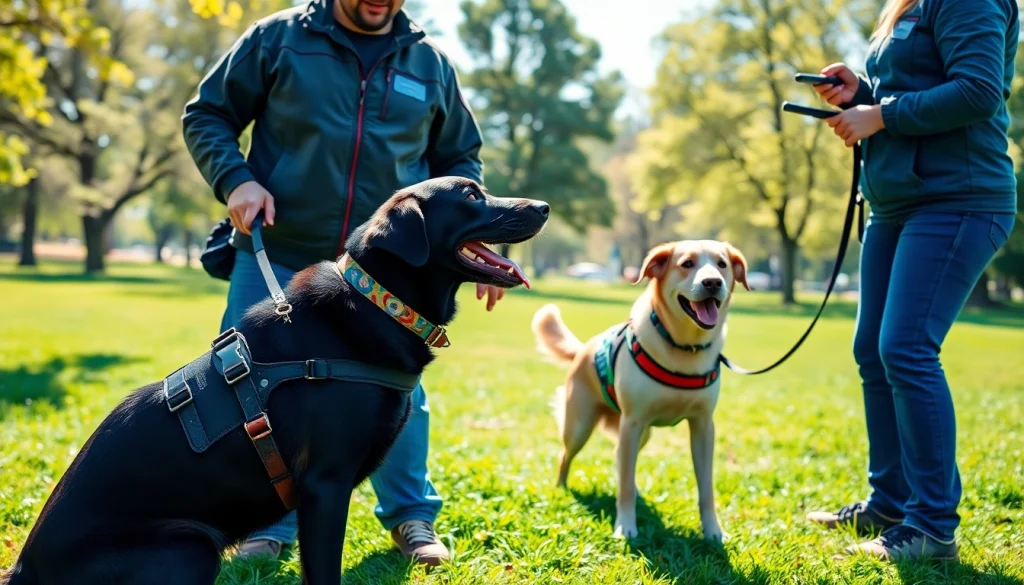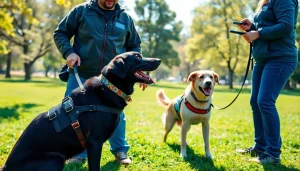
Understanding Service Dogs
What are Service Dogs?
Service dogs are specially trained animals that perform tasks to assist individuals with disabilities. Unlike emotional support animals or therapy dogs, service dogs undergo rigorous training to perform specific tasks that directly mitigate their handlers’ disabilities. They can help with a variety of conditions, including, but not limited to, mobility impairments, visual impairments, diabetes, autism, PTSD, and seizures. The bond between a service dog and its handler is not just one of companionship but also of support and independence.
Types of Service Dogs for Sale
Various types of service dogs exist, each trained to assist with different needs:
- Mobility Assistance Dogs: These dogs help individuals with physical challenges navigate daily tasks, such as opening doors, retrieving objects, or providing balance and stability.
- Guide Dogs: Specifically trained to assist visually impaired individuals, guide dogs help navigate obstacles and ensure safety while crossing streets or moving through crowded areas.
- Hearing Dogs: These dogs alert deaf or hard of hearing individuals to important sounds, such as alarms, doorbells, or crying babies.
- Psychiatric Service Dogs: Trained to assist individuals with mental health conditions, such as PTSD or severe anxiety, these dogs help manage symptoms by providing comfort and alerting to pending episodes.
- Medical Alert Dogs: These dogs are trained to recognize signs of medical conditions such as seizures or low blood sugar and can alert their handlers or others for help.
The Importance of Training
Proper training is crucial for any service dog. Training typically involves a combination of basic obedience training, specialized task training, and socialization. Professional trainers often utilize positive reinforcement methods to teach the dogs their specific tasks. Furthermore, training not only prepares the dog to assist its handler effectively but also ensures that the dog behaves appropriately in public settings. Organizations that provide service dogs usually follow stringent guidelines to ensure their training meets the high standards needed for service work.
How to Choose the Right Service Dog
Assessing Your Needs
Choosing the right service dog begins with an honest assessment of your needs. Consider the specific challenges you face daily and how a service dog can assist you. For example, if you struggle with mobility, you may need a mobility assistance dog that can help you navigate your environment. Understanding your requirements is crucial to ensuring that the service dog you choose can adequately support you.
Evaluating Dog Temperament
The temperament of the dog is another critical factor. Service dogs must possess certain qualities such as calmness, sociability, and a strong desire to please. It is essential that the dog can handle various public environments without becoming overly stressed or distracted. Potential handlers should spend time with the dog to evaluate its behavior and compatibility with their specific needs.
Working with Certified Breeders
Finding a service dog from a reputable source is vital. Certified breeders and organizations with experience in service dog training often have the best dogs. When looking for service dogs for sale, ask about the dog’s lineage, training background, and socialization experiences. A responsible breeder will provide thorough documentation of the dog’s training and health history, ensuring that you make an informed choice.
Where to Find Service Dogs for Sale
Online Resources
The internet is a valuable resource for finding service dogs for sale. Different websites often list available dogs, providing detailed descriptions of their training, temperament, and suitability for various needs. Online platforms also allow you to connect with service dog organizations, where you can learn more about the dogs and fill out applications.
Local Organizations and Shelters
Local non-profit organizations and shelters may also provide service dogs for those in need. These organizations sometimes work with rescue dogs, providing them training as service animals for individuals with disabilities. Reach out to local animal shelters and inquire about any service dog programs they may have.
Networking with Other Service Dog Handlers
Networking with other service dog handlers is a beneficial way to gather insights about finding a service dog. Joining local or online support groups can provide valuable leads on where to find dogs and insights on the training and everyday experiences associated with service dog ownership.
The Cost of Service Dogs for Sale
Understanding Pricing Factors
The price of service dogs can vary widely based on multiple factors, including the dog’s breed, training level, and the organization from which it is sourced. Service dogs can range from a few thousand dollars to much higher amounts based on their training and capabilities. Understanding these factors is essential to budgeting properly for your service dog.
Financial Assistance Options
Due to the high cost associated with obtaining and maintaining a service dog, various financial assistance options may be available. Some organizations offer grants or funding to individuals in need, while others may provide payment plans. Researching these options thoroughly can help alleviate the financial burden that often accompanies service dog ownership.
Budgeting for Ongoing Care
Beyond the initial purchase price, potential service dog owners should also budget for ongoing expenses such as food, veterinary care, training refreshers, and equipment. Creating a detailed budget that accounts for these costs ensures that you can provide ongoing support for your service dog throughout its life.
Legal Aspects of Service Dogs
ADA Compliance and Rights
The Americans with Disabilities Act (ADA) establishes laws around the rights of individuals with service dogs. Under the ADA, service dogs are permitted to accompany their handlers in all public spaces, including stores, restaurants, and public transportation. Understanding your rights and the scope of ADA protection is vital for anyone considering a service dog.
Registration and Documentation Requirements
While there is no formal registration required for service dogs under the ADA, it’s essential to gather and maintain documentation of the dog’s training and your specific needs. This documentation can support your rights in public settings and facilitate your interactions with businesses and public places.
Emotional Support Dogs vs. Service Dogs
It’s important to understand the distinction between emotional support dogs and service dogs. Emotional support dogs provide comfort and companionship but are not trained to perform specific tasks related to a person’s disability. Consequently, emotional support dogs are not afforded the same legal protections as service dogs under the ADA. Understanding this distinction can help clarify the expectations and rights of both service dog handlers and the general public.






